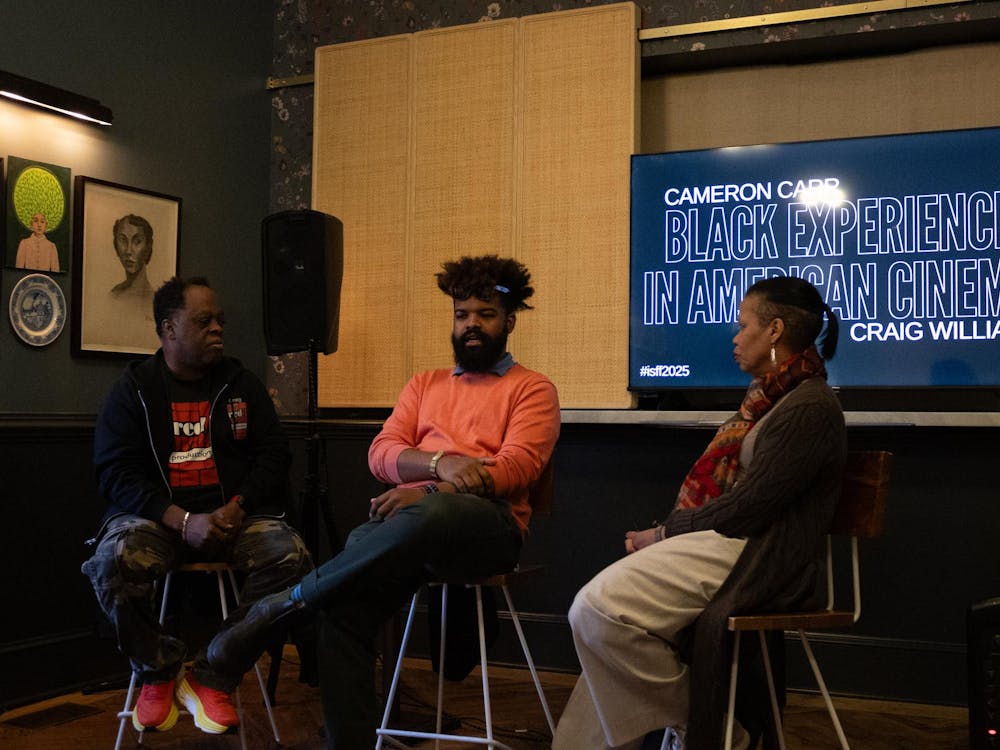In the heat of the day Sunday afternoon, Shakespeare on the Lawn presented its version of “Hamlet.” The audience watched from folding chairs and blankets strewn across the grass. The actors had few props and no stage equipment. This was no ordinary theater — instead, actors had an entire garden to serve as their stage.
A primarily student-run organization, Shakespeare on the Lawn has the goal of making William Shakespeare’s plays accessible to a wider modern audience. For its spring production, the group chose William Shakespeare’s “Hamlet,” which tells the story of a prince plunged into existential misery and eventual madness as he tries to enact vengeance on his uncle for murdering his father and marrying his mother. While there have been many interpretations of this classic tragedy, Shakespeare on the Lawn had one theme in mind — timelessness.
In their co-directors’ note, third-year Engineering student Autumn Routt and third-year Education student Emma DeMartino said they want to highlight the show’s applicability to modern situations. They wanted to emphasize the themes focusing on mortality, humanity, identity and responsibility to both oneself and others.
“With so many characters coming of age, and trying to find their place in the world, the themes in this play are especially relevant to college students,” Routt and DeMartino said.
This focus on timelessness informed a lot of the group’s artistic decisions. Not only did Routt and DeMartino keep the time period vague, but cut scenes that contained Fortinbras, heir to Norway’s crown. In the co-directors’ vision, the historical nature of the political subplot surrounding Fortinbras kept “Hamlet” firmly set in the past and had to be cut.
“We definitely got rid of as much of the specific-to-Denmark-politics aspects as we could so that we can maintain that theme of timelessness,” the pair said in an interview with The Cavalier Daily.
The co-directors also faced challenges with adapting the space, University Pavilion Garden VIII, to suit their needs. Routt and deMartino tried to use the lack of a curtain to their advantage.
“[The space] challenged us to make all of the entrances and exits really purposeful,” Routt said. “We mostly had royalty use the middle stairs. And then when people used the side paths, it was usually because they were in some way distressed.”
The dead characters definitely posed an issue for the co-directors. Since blackouts — the usual method of ushering actors offstage — were no longer an option, Routt and DeMartino had to get creative. Their solution was to have the Ghost of Hamlet’s father touch each dead character, having them rise from their fallen positions and become another ghost wandering offstage.
“We decided to introduce the ghosts at the end, kind of bringing a full circle moment for the characters, to bring them off the stage, and also to bring them into the afterlife,” DeMartino said. “The theme of death that was introduced at the beginning is now introduced at the end.”
The creative use of their surroundings added a special element to the cast’s performance. The garden had a hill and a set of stairs, with the audience stationed at the bottom. The performance area was expansive and allowed for character movements offstage to occur simultaneously with the following scene.
Characters could move freely without the confines of a stage, and move they did. Claudius, played by fourth-year College student Christopher-Thomas Cordero, paced the stage while scheming. The Ghost of Hamlet, played by third-year College student Lex Schwartzman, wandered on top of the hill, appearing in the peripheral of scenes. Ophelia, played by fourth-year College student Lydia Smith, even directly interacted with the audience, handing out flowers to those in the front row. The open stage was used in every way possible, and the cast infused that motion into their performances.
Perhaps the most energetic of the cast was Hamlet, played by third-year College student Will Clemons. He utilized the space provided to the utmost degree, whether it was pacing during a monologue or dueling to the death. During a particularly memorable occasion, Clemons flamboyantly kicked and danced behind the king’s prattling advisor, Polonius, played by second-year Engineering student Miranda Khoury.
This Hamlet was only dynamic in movement, but in emotion as well. From brooding to mocking to outraged, Clemons was intense in everything that he did. Clemons admitted that these strong, uncontrollable emotions were key to his interpretation of the character.
“[Hamlet] is a man who really concerns himself with the thoughts and feelings of other people,” Clemons said. “He wasn’t able to live his own life, so I feel like he’s a child who, when told what to do, rebels against it.”
Altogether, the performance was creative and expressive. Shakespeare on the Lawn promised a timeless delivery of a classic tragedy, and rewarded its audience with just that.







